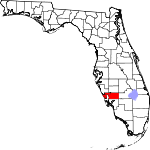Charlotte County Criminal Court hears all criminal cases in Charlotte County. Below you will find specific information about criminal cases and how they are handled in Charlotte County.
Jury by Trial Right
The US Constitution (Article 3 along with the 6th Amendment) ensures an accused defendant the right to a jury trial. This applies to crimes that have a $500 fine or a potential sentence of six months in jail (aka Serious Crimes). This right to trial by jury can also be waived by a defendant.
What is a Plea Agreement?
A plea agreement is a deal made between the prosecution and the defendant in a case, where the defendant agrees to plea guilty to a particular charge in exchange for some concession from the prosecutor. In practice, more than 90% of criminal cases end with a plea agreement.

Charlotte County Criminal Court
Where can I get help for my Charlotte County criminal case?
The 6th amendment of the United States Constitution provides a criminal defendant with the right to an attorney. As read in the miranda rights, this means that if a defendant cannot afford to hire a private attorney a legal attorney will be appointed to the defendant to represent him at no cost to the defendant. This is often a public defender. In addition, the court clerk for Charlotte County will also be able to provide general information about a specific criminal case. The clerk can only provide information and is not an attorney so they cannot provide legal advice, only a licensed attorney can provide legal advice about what the best options for are for your particular case.
What if I can’t afford an attorney?
The 6th Amendment guarantees you the right to an attorney whether or not you can afford one. If you cannot afford one, a public defender will be appointed by the court to represent you.
Charlotte County Criminal Court hearings
Criminal hearings in Charlotte County will take place at the Charlotte County Criminal Courts. Please see here for a list of the Charlotte County Criminal Court Locations.
What happens in Charlotte County at an arraignment?
In Charlotte County the defendant is brought into court and informed by the judge of the charges that have been filed against them along with informing them of their rights. At this time, the defendant can plead guilty, not guilty or no contest. If the defendant pleads guilty or no contest, there will be no trial and the defendant may be sentenced immediately or at a later date. If the defendant pleads not guilty a trial date is set.
Appealing a Criminal Conviciton
A defendant may appeal a criminal conviction to an appellate court. In an appeal, the actual trial is not redone, but the appellate court hears arguments that the criminal case was not handled in a legal manner at the original criminal court. The appellate court can either uphold the conviction, or determine that errors were made and may request a retrial, a resentencing of the defendant or that the charges be dismissed.
Who is the prosecutor for Charlotte County?
Depending upon the case, the prosecutor for Charlotte County criminal cases will either be a representative of Charlotte County or a representative from Florida. After reviewing evidence it is the prosecutor’s decision whether to file charges or drop a case. Most prosecutors have the ability to negotiate plea bargains, and determine how the case will be prosecuted.
Defendant Sentencing
At a sentence hearing the judge will inform the defendant of the sentence that will be imposed. This sometimes occurs at the same hearing in which the defendant is found guilty (either by trial or plea agreement). In can also occur at a later date, most often this is due to the complexity of the case where more time is needed to determine the appropriate sentence.
Jury Deliberations in Charlotte County
In Charlotte County, jury deliberations will take place in a jury trial after the prosecution and defense have presented their cases and rested. At this point, the judge will provide a list of instructions to the jury about what they are allowed and not allowed to do and what verdict options are available for them to decide. The jury will be sent to a private room to discuss the evidence presented in the case and attempt to reach a unaminous decision. When a unaminous decision is reached, the jury will inform the judge that they have reached a verdict and will return to the courtroom for the verdict to be read allowed. In the event that the jury cannot reach a unanimous verdict, the jury results in a deadlock and a mistrial is declared.
Burden of Proof Requirement
In a criminal case in the United States, the burden of proof always requires the prosecutor to prove beyond a reasonable doubt that the defendant is guilty. This is a high threshold that must be met by the prosecution when presenting evidence in a case. If the prosecution fails in it’s burden to prove guilt beyond a reasonable doubt the judge must find the defendant not guilty. In a jury trial, the judge will inform the jury what this burden is and their obligation to find the defendant not guilty if they feel the prosecution did prove the defendant’s guilt beyond a reasonable doubt.
Required Court Appearances in Charlotte County
Any required court appearances in Charlotte County Criminal Court must be attended by the defendant. Failure to appear in court at your required date and time may result in the judge issuing an arrest warrant.
Charlotte County Criminal Court Locations
-
Charlotte County Circuit Court
Address: 350 East Marion Avenue, Punta Gorda, FL 33950
Phone: 941-505-4716 -
Charlotte County Circuit Court
Address: 18500 Murdock Circle, Port Charlotte, FL 33948
Phone: 941-743-1400 -
County Court of Charlotte County
Address: 350 East Marion Avenue, Punta Gorda, FL 33950
Phone: 941-505-4716 -
County Court of Charlotte County
Address: 18500 Murdock Circle, Port Charlotte, FL 33948
Phone: 941-743-1400